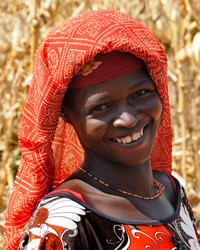Dendi, Dandawa in Niger

Photo Source:
Jacques Taberlet - Wikimedia
Creative Commons
|
Send Joshua Project a map of this people group.
|
| People Name: | Dendi, Dandawa |
| Country: | Niger |
| 10/40 Window: | Yes |
| Population: | 151,000 |
| World Population: | 487,900 |
| Primary Language: | Dendi (Benin) |
| Primary Religion: | Islam |
| Christian Adherents: | 0.10 % |
| Evangelicals: | 0.03 % |
| Scripture: | New Testament |
| Ministry Resources: | Yes |
| Jesus Film: | Yes |
| Audio Recordings: | Yes |
| People Cluster: | Songhai |
| Affinity Bloc: | Sub-Saharan Peoples |
| Progress Level: |
|
Introduction / History
The Dendi are a subgroup of the Songhai people of West Africa and speak a Songhai language. They trace their origin to the great Songhai Empire of the sixteenth century, though their roots go even further back to the Za Kingdom of the 8th century. They live in the northern parts of Benin, as well as in Togo, Nigeria and Niger. In Niger, they are located on the southern border around the city of Gaya. Many years ago, the Dendi traveled as merchants throughout the Niger River Valley, selling their goods and services and settling along the principal caravan routes.
What Are Their Lives Like?
Today, the Dendi people have become a group with significant political influence in regional politics. In some of the larger cities, the Dendi form a very powerful commercial elite. Many continue to work as merchants, while others are farmers who grow maize, millet, manioc and plantains.
Most farming is done by the men only. Women, however, grow vegetables and herbs in their own personal garden plots inside their villages. The surplus produce from these gardens covers the cost of such necessities as tools, clothing and expenses for birth and marriage ceremonies. Many Dendi also raise animals such as cattle, camels, sheep, goats and chickens. In contrast to their southern neighbors, the Dendi milk their cows and goats, and make butter from the milk. There are regular markets on both local and regional levels, with the caravan trade still playing an important role in the Dendi economy. They trade cotton fabrics, leather goods, kola nuts, salt, dried fish, and other articles.
Most Dendi men have one wife, but if he has more, each wife has a separate hut. There, she will raise her children until they marry or are old enough to move out on their own. Typically, Dendi men marry in their early 30s and girls marry while in their teens. All children belong to the husband's lineage group, even in cases of divorce. In the rural areas, individual huts of a household unit are rectangular, and they use mud for their construction. Their roofs are made of corrugated tin.
The Dendi have intermarried with the local peoples in the regions in which they live. In some ways, such as religion, the Dendi have become indistinguishable from them.
Dendi society is patrilineal. They believe all their people stem from the same male ancestor. Children become part of the father's side of the family.
What Are Their Beliefs?
The Dendi have completely converted to Islam, and they belong to any number of Muslim sects. The clothes they wear, the calendar they follow, the naming of their babies, and the wake for the dead follow the same customs practiced by Muslims around the world. Most Dendi live in rural areas and keep some of their traditional religious practices in conjunction with Islam. The belief in natural forces and spirits forms the basis of their ethnic religion. They still depend on elders and specialists, who they believe are able to tell the secrets of nature and spirits. They also practice ancestor worship and witchcraft, which is discouraged among dedicated Muslims.
What Are Their Needs?
The Dendi New Testament has been translated into their language, but they still lack a complete Bible. Still, the great majority have never had an opportunity to hear the gospel, and it's hard to get Christ's ambassadors into Niger.
Prayer Points
Pray for Christ's servants to make an impact on Dendi communities in Niger. Pray for the Lord to bless Dendi crops as a testimony of his power and goodness. Pray for the Dendi people to desire to find spiritual truth. Pray for a church planting movement among the Dendi people in Niger.